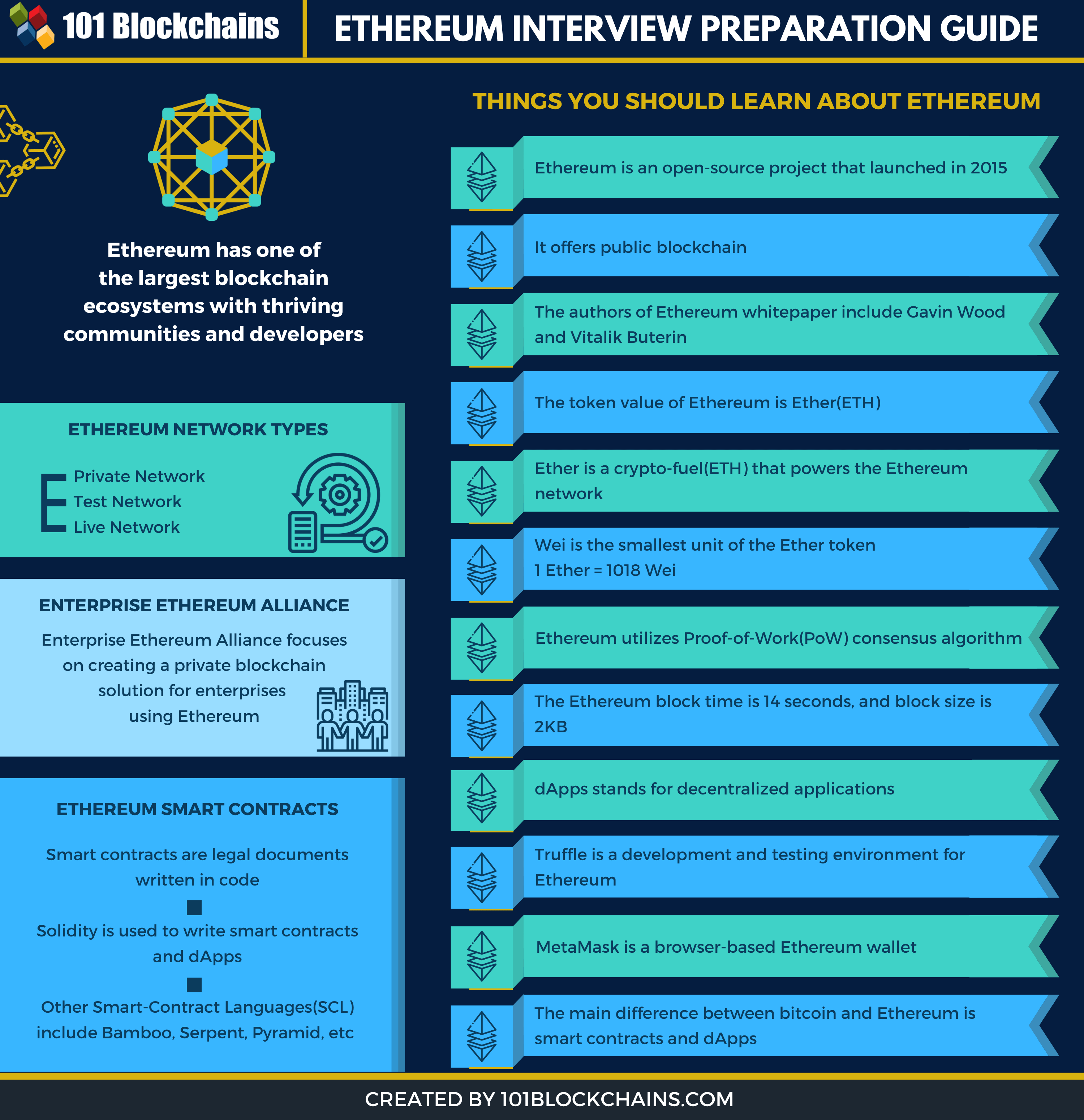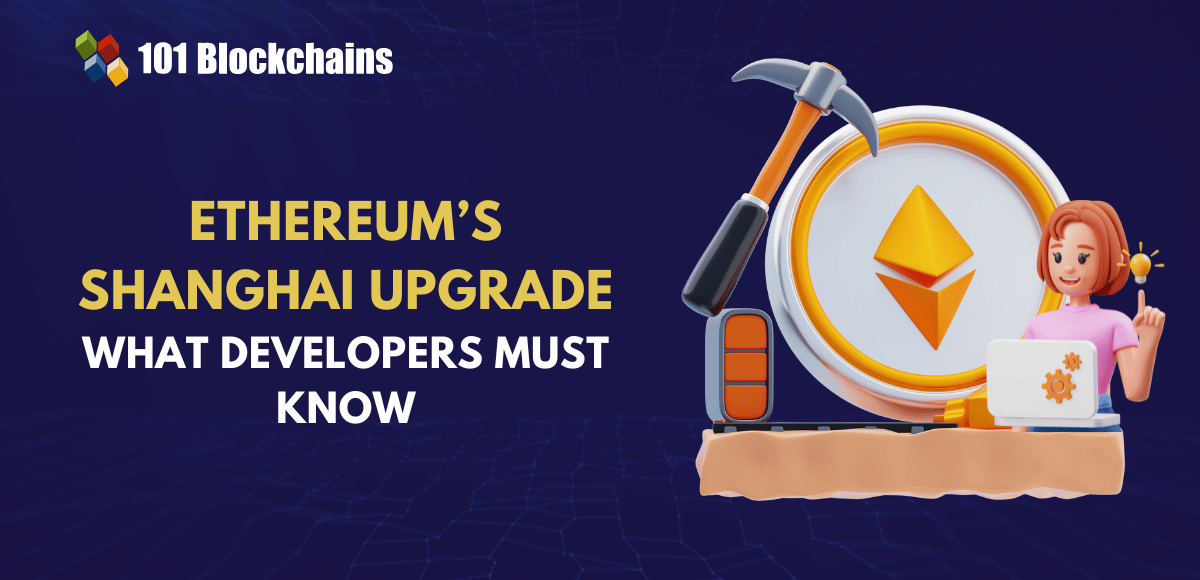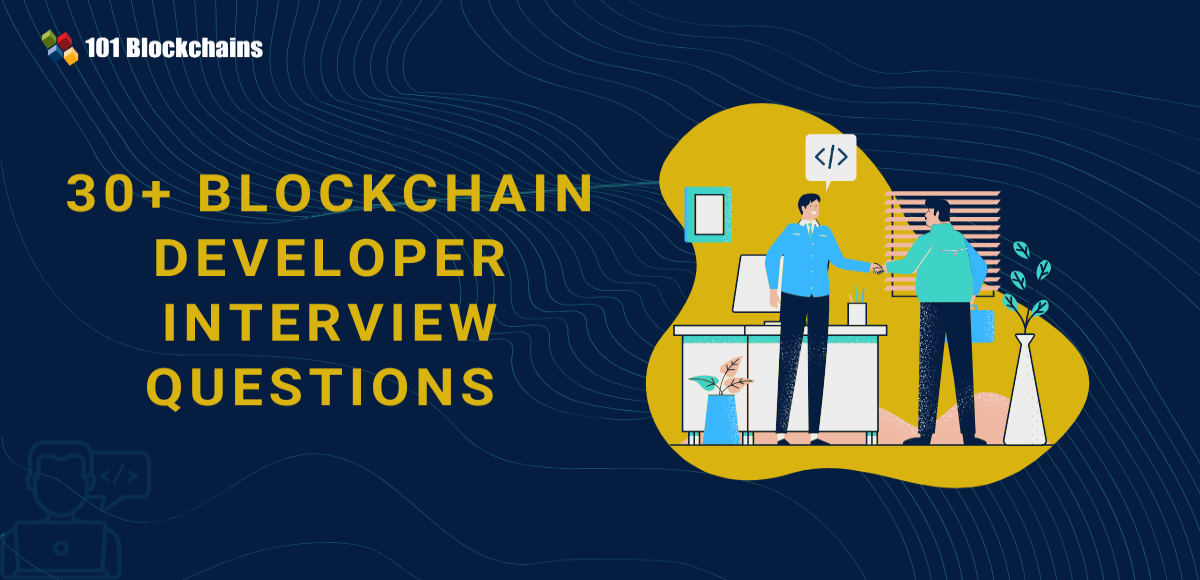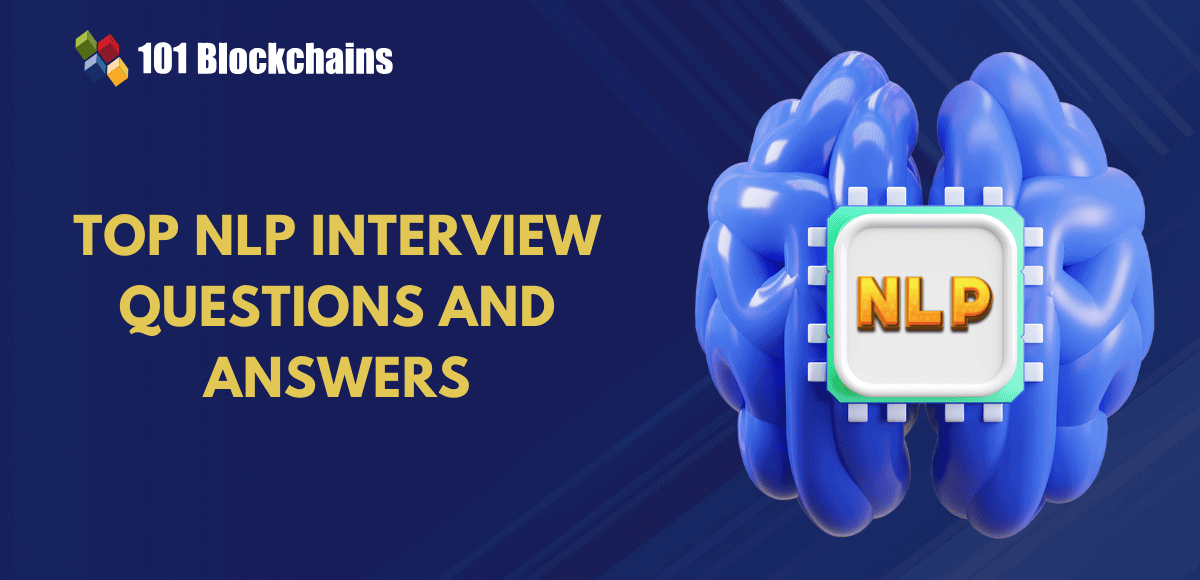Learn how blockchain truly works, master key definitions, and uncover what makes smart contracts so "smart." Dive into the fundamentals, gain valuable insights, and start your blockchain journey today!
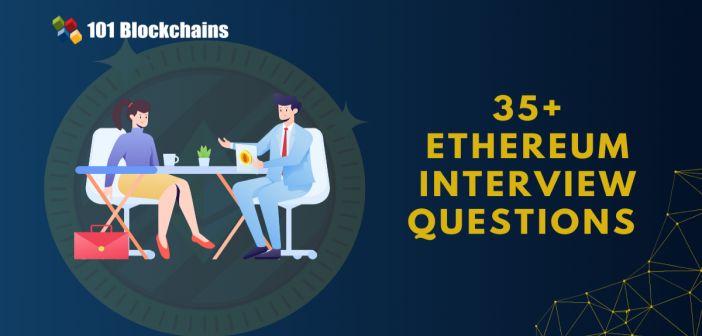
- Ethereum
Georgia Weston
- on March 24, 2020
35+ Ethereum Interview Questions and Answer
Preparing for an Ethereum interview? Here’s an expert guide that will cover the most popular interview questions for Ethereum and help you in your preparation.
There is a huge surge in demand for Ethereum developers. As a blockchain learner, you should not give up the opportunity to advance your career. Ethereum is one of the biggest blockchain platforms on the market now. So, many companies are now looking for professionals who are experts in Ethereum development. Therefore, it’s the perfect opportunity to land a job in an enterprise company. In this article, we will go through the top Ethereum interview questions. You will also find many Solidity interview questions, as they both are related to each other.
Excited to build your skill in Ethereum development by leveraging the ethers.js library? Enroll Now in Ethers.Js Blockchain Developer Course!
Why Ethereum? Understanding Its Demand
Ethereum has been the most popular decentralized ledger technology out there. It is partially because of the Ethereum cryptocurrency and the ability to create decentralized apps through the Ethereum blockchain solution. Ethereum is a public blockchain solution. There is also an enterprise Ethereum, which enables companies to implement a permissioned Ethereum network.
The ecosystem of Ethereum makes it a great choice for developers. It has one of the most deployed decentralized apps on blockchain networks. Its ease of use and the ability to use Solidity to program smart contracts and dApps opens up a lot of opportunities for the organizations out there. There is no doubt that Blockchain is in high demand. This also makes it one of the top technologies for which companies are seeking talent.
Excited to learn the basic and advanced concepts of ethereum technology? Enroll Now in The Complete Ethereum Technology Course
Preparing for Blockchain Interview
Before we go and list the top Ethereum blockchain interview questions, it is important to learn how to prepare for an interview, especially for a blockchain interview. In reality, Ethereum is just a small part of the blockchain interview questions.
For top positions like Blockchain professional, you may have to cover all of the topics related to Blockchain and not only Ethereum interview questions. So, it’s crucial that you also check out other interview questions that cover more platforms and definitions.
Build your identity as a certified blockchain expert with 101 Blockchains’ Blockchain Certifications designed to provide enhanced career prospects.
35+ Top Ethereum Interview Questions and Answers
Let’s get started with the most popular Ethereum developer interview questions.
Please include attribution to 101blockchains.com with this graphic. <a href='https://101blockchains.com/blockchain-infographics/'> <img src='https://101blockchains.com/wp-content/uploads/2020/03/ETHEREUM-INTERVIEW.png' alt='Top Ethereum interview questions='0' /> </a>
Basic Ethereum Interview Questions
1. What Is the Ethereum Network? Explain.
Answer: Ethereum is a second-generation distributed ledger technology that builds upon the bitcoin network. It was first launched in 2015, and it has continued to grow from there. It is an open-source public distributed ledger technology. Technically, it is also an operating system with key features such as smart contracts, transaction-based state transitions, and virtual machines.
2. Who Is the Founder of Ethereum?
Answer: There are two original authors of Ethereum, including Vitalik Buterin and Gavin Wood.
3. What Is EVM?
Answer: EVM stands for Ethereum Virtual Machine. It is a decentralized virtual machine capable of handling scripts using the public nodes network. It is also Turing complete and utilizes Gas as an internal pricing mechanism.
Want to learn about the ethereum fundamentals? Enroll Now in Ethereum Development Fundamentals Course
4. What Is the Value Token for Ethereum?
Answer: The token value of Ethereum is Ether (ETH).
5.What Is Ether?
Answer: Ether is best defined as a crypto-fuel(token) that powers the Ethereum network. It powers the smart contracts and provides the nodes an incentive to validate the Ethereum blockchain blocks. Once a block is validated, 5 Ether is released to nodes that took participation in the process.
6. What Is the Consensus Algorithm?
Answer: Consensus algorithms are best defined as the way to validate transactions in a distributed ledger technology. It is a way to reach an agreement or consensus among peers about the state of the DLT. This method is very important as without it, the distributed ledgers’ core philosophy would not stand. There are many popular consensus algorithms out there, including Proof-of-Work (PoW), Practical Byzantine Fault Tolerance (PBFT), Proof-of-Stake (PoS), Proof-of-Burn (PoB), and so on.
7. Which Consensus Algorithm Does Ethereum Use?
Answer: Right now, Ethereum utilizes Proof-of-Stake as its consensus algorithm.
8. What Are Smart Contracts?
Answer: Smart contracts are like legal documents in code. It is a computer protocol that can be used as a digital verification process or enforce negotiations between parties. Smart contracts are also transparent and automated. In short, it offers a conflict-free approach to deals, agreements, and disputes.
Curious to understand the complete smart contract development lifecycle? Enroll now in Smart Contracts Development Course Now!
9. What Is the Ethereum Node?
Answer: Ethereum nodes talk with each other using the Ethereum blockchain protocol. They interact with the outside world using the JSON-RPC interface.
10. What Are Private Keys?
Answer: Private keys are used to secure an address. It should be kept secure by the owner as anyone who has it gives ownership to the one who possesses it. In contrast, the public key is available online. Private keys and public keys are different, and they have different functionalities. You can check out the comparison of private key vs public key to understand how they differ.
Best Ethereum Interview Questions: Medium Difficulty
11. What Are the Real-World Use Cases of Ethereum?
Answer: There are many use cases of Ethereum. Some of them are as below.
- Decentralized Finance: One of the biggest use cases is decentralized finance (DeFi). It improves how the financial sector works and improves loans using smart contracts.
- Digital Identity: Digital Identity is another use-case where a person’s identity is digitized, providing better usability for individuals as they do not have to carry documents and can be verified instantly through a connected network.
- Health applications: Blockchain for healthcare systems can utilize Ethereum based solutions to implement a decentralized network and improve things such as drug tracking, better patient management, and so on.
- Supply Chain: Ethereum is very useful in creating the tokenization of real-world assets. This makes it easy to trade items on the Blockchain for supply chain management solution.
- Payments: It also improves payments, especially cross-boundary transactions. Therefore, it’s perfectly suited for any blockchain in payment solutions.
Start learning Ethereum with World’s first Ethereum Skill Path with quality resources tailored by industry experts Now!
12. Tell Us About the Enterprise Ethereum Alliance (EEA)?
Answer: The Enterprise Ethereum Alliance (EEA) consortium blockchain was created in March 2017 by Fortune 500 companies, research groups, and blockchain startups. It has more than 100+ non-profit organizations as members. The focus is to create a member-driven standard that can develop an open blockchain specification for interoperability and harmonization. It also facilitates a permissioned implementation of the Ethereum network fine-tuned according to the enterprise requirements.
13. What Is Wei? How Does It Differ from Ether?
Answer: Wei is the smallest unit in the Ether cryptocurrency that is used in the Ethereum network.
1 Ether = 1018 Wei. It is important to break down Ether as it can help nodes to maintain the amount of Ether required for certain actions. It also helps the cryptocurrency market as people can buy or sell a fraction of Ether.
Want to become a Cryptocurrency expert? Enroll Now in Cryptocurrency Fundamentals Course
14. Explain How Proof-Of-Work (Pow) Works?
Answer: Proof-of-Work is a consensus algorithm that requires work from miners to validate the transactions. The work is generated by solving complex computational problems using hardware. It is not environmentally friendly as it requires a lot of electricity to run the hardware, which in turn solves those complex computational problems.
15. What Is the Difference Between Bitcoin and Ethereum Blockchain?
Answer: The main difference between Bitcoin and Ethereum Blockchains is how they work and their features. Bitcoin is a first-generation blockchain technology that offers the foundation of the decentralized ledger. Ethereum, on the other hand, builds on what Bitcoin has to offer by providing a more scalable and programmable blockchain solution. There are Ethereum smart contracts and the ability to design and implement distributed apps (dApps).
Want to become a bitcoin expert? Enroll Now: Getting Started With Bitcoin Technology Course
16. What Is Dapps?
Answer: dApp stands for decentralized application. These applications are created to take advantage of blockchain technologies. dApps offer many benefits, including being decentralized and open source. It also follows protocols and incentivizes nodes that take part in the functioning of the dApp. Ethereum is a popular blockchain network for dApps as it offers the right ecosystem for developers to create real-world dApps.
17. Where Are the Transactions Recorded?
Answer: The Blockchain records transactions a public ledger in the case of Ethereum. However, if a permissioned network is used, then the records are stored in a private ledger with certain information available to the public.
18. Tell Us About the Type of Ethereum Networks That Exist.
Answer: There are three types:
- Private Network
- Test Network, e.g., Rinkeby and Ropsten
- Live Network, i.e., the main Network
19. How to Mine Ethers?
Answer: To mine ethers, one needs to have a wallet and tools such as Geth CLI. With it, you need to participate in the Network and help add transactions to the blocks.
20. Tell Us About Smart Contract Use Cases?
Answer: There are many smart contract use cases. For instance, it can be used in real estate where a seller can set up a smart contract to sell properly. The property can be transferred to the buyer once he transfers the property amount.
21. What Is Metamask?
Answer: MetaMask is a popular browser-based Ethereum wallet that can be used to interact with the dApps on the Ethereum network.
22. What Is the Programming Language Used to Write Smart Contracts and Dapps?
Answer: Solidity is the main programming language that is used to create both dApps and smart contracts. However, smart contracts in Ethereum can also be written using any of the smart-contract languages (SCL). Some of the SCL examples include Vyper, Bamboo, Serpent, Ethereum bytecode, Pyramid, L4, and others.
23. What Are the Benefits of Having A Private Network?
Answer: Private networks are very useful when it comes to data privacy. It is also useful for permissions testing and control. Hyperledger Fabric is a private network, which is a lot different than Ethereum.
Excited to learn about Hyperledger Fabric, Enroll Now in Getting Started with Hyperledger Fabric Course
Best Ethereum Interview Questions: Expert Level
24. What Are the Main Steps of Smart Contract Development from A Business Perspective?
Answer: Many key steps are required to be taken when doing smart contract development. The steps are as below.
- Reconfirm that your business really needs smart contract development.
- Understand the limitations of smart contracts
- Plan how to carry out the development
- Hire a smart contract developer
- Do proper testing before deploying the smart contract
25.What Is Truffle?
Answer: Truffle is a popular testing and development environment for Ethereum. It also offers an asset pipeline, which makes it handle Ethereum based projects. With it, a developer can create smart contracts, dApps, do automated testing, configure and build pipelines, and so on. It is a perfect framework for developers using Ethereum.
26. What Is Block Time and Average Block Size in Ethereum?
Answer: The block time is 2 KB, whereas the average block size is 14 seconds.
27. Can A Transaction Be Kept Hidden?
Answer: In the case of the public Ethereum network, no transactions can be kept hidden. All transactions are public.
28. Is the User’s Private Key Used to Sign Transactions?
Answer: Yes.
29. How Do You Recover an Ethereum Account with No Private Key?
Answer: It can only be recovered in only one way: 12 work mnemonic, which was set during the account creation process.
30.What Is Geth?
Answer: Geth is a command-line interface used when running a full Ethereum node. It’s one of the best blockchain tools out there.
Start your blockchain journey Now with the Enterprise Blockchains Fundamentals
31. How Can You Connect to A Node?
Answer: You can connect to a node using three ways: WS-RPC, JSON-RPC, and IPC-RPC.
32. What Is Geth’s Fast Sync?
Answer: Geth’s fast sync works with syncing the download transaction
33. What Is the Functionality of Testnet?
Answer: Testnet is used to connect to the Ropsten Network.
34. Do You Need to Use Real Ether to Test Dapps And Smart Contracts?
Answer: No, it is not required. In test networks, you can use free Ether.
35. How Does “Spending” Work in Smart Contracts?
Answer: If there is a request that does not modify the smart contract and is used to return values, then there is no cost associated with the task. However, any action that can be used to modify the smart contract test will cost money, i.e., Gas.
36.What Is Remix?
Answer: Remix is a useful online tool that can be used to deploy, test and develop smart contracts. By using it, developers can quickly test their smart contracts.
37. How Bitcoin and Ethereum Differ When It Comes to Checking the Latest State.
Answer: Ethereum checks the latest state for the account balance. Bitcoin, on the other hand, checks unspent transaction outputs (UTXO).
38. What Happens When the Gas Runs Out Without the Transaction Being Complete?
Answer: In this case, all the state changes are reversed. The used Ethereum Gas is given to the miner.
Start learning Blockchain with World’s first Blockchain Career Paths with quality resources tailored by industry experts Now!
Conclusion
This leads us to the end of our best Ethereum Interview questions. Ethereum is huge and hence requires careful study. If you are seriously planning to crack the Ethereum interview questions, then you should have a good in-depth knowledge of it. Simply relying on the interview questions won’t take you far.
So, what do you think about the Ethereum job interview questions and answers? If you are interested in preparing more about Ethereum, then enroll in our Ethereum development course, which will cover everything you need.
*Disclaimer: The article should not be taken as, and is not intended to provide any investment advice. Claims made in this article do not constitute investment advice and should not be taken as such. 101 Blockchains shall not be responsible for any loss sustained by any person who relies on this article. Do your own research!

